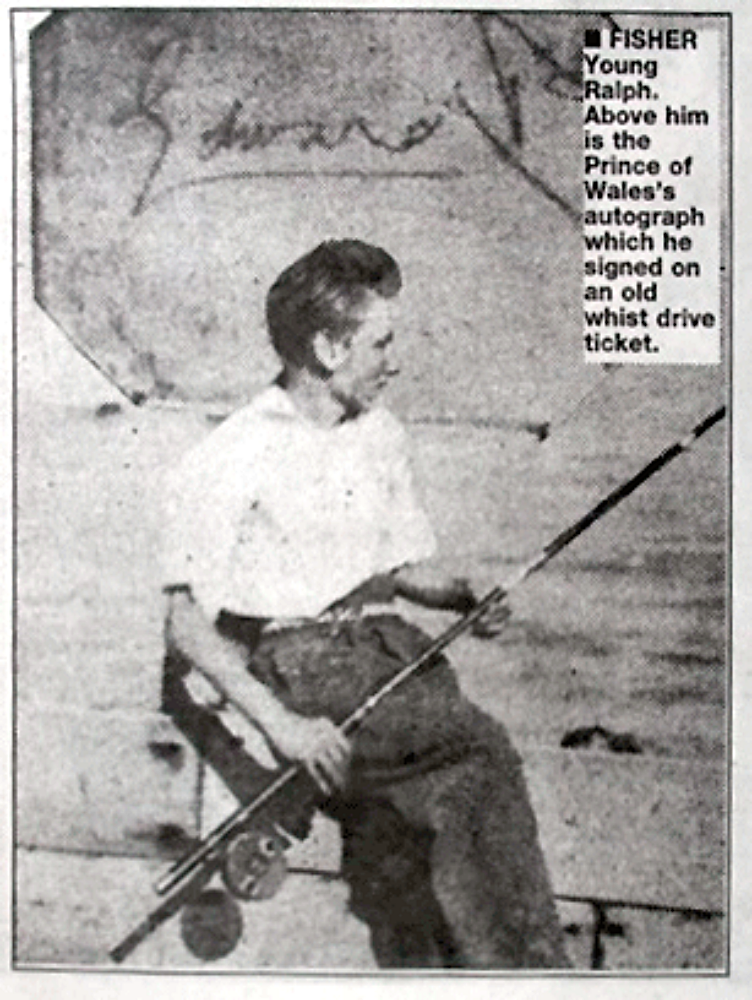Prince of Wales on the beach at Ferrin

GETTING 1928 into historical perspective, it was the year that wonder child Yehudi Menuhin made his sensational debut as an international violinist, Mae West went to jail for “indecent behaviour” in a Broadway show, Charles Lindbergh became the first to fly the Atlantic solo and Al Jolson starred in the first talking movie.
It was also the year that Wyatt Earp died with his boots on, a world financial disaster followed the Wall Street crash, the Graf Zeppelin airship girdled the earth in 21 days and full colour television pictures were produced for the first time – the size of a postage stamp!
In Worthing, the Prince of Wales (who later became King Edward V111 but quickly abdicated for love of American divorcee Mrs Wallis Simpson) was learning to improve his game of golf.
At the beginning of August 1928, the much-loved prince was holidaying in Ferring with his favourite mistress, Mrs Dudley Ward –he had yet to meet the love of his life, Mrs Wallis Simpson. The first weekend he turned up at Worthing Golf Club, signed the visitors book, paid his green fee just like anybody else – and played every shot off the tees with an iron.
He began with a foursome game (which of course included Mrs Dudley Ward) but by the following weekend evidently felt sufficiently confident to play the Worthing course with her alone.
According to R.J. Gerrard, the club’s acting secretary at the time. “At the beginning he never used his wooden clubs, but before he had finished his holiday, twelve visits to the club and six weeks later, he was using the wooden clubs and hitting remarkably long shots!
“He hit an exceptionally long ball for a little fellow and kept it beautifully straight.” Another story I’ve unearthed about the prince’s holiday in Ferring that year involved a 15-year-old local boy named Ralph Newman.
Young Ralph was an enthusiastic fisherman and one August morning that year was digging for bait on the sands at Goring. A small, slight man who looked vaguely familiar paused and began chatting about the bait he was seeking. It was the Prince of Wales, out for a stroll along the beach.

Ralph said afterwards: “He was so nice and so interested that when I realised who it was I was not at all shy. The prince even helped me pick up worms and put them in my tin!
`The trouble was, I knew my mother would never believe that I had spoken to the Prince of Wales unless I had something to prove it. So I asked him for his autograph, which he agreed to give me but all I had in my pocket was a piece of an old whist drive ticket.
`The prince said it was rather a dirty piece of paper but I said it’s all I have, sir. He then signed it Edward P.
In Worthing, 1928 had begun with what at the time was described as “a slight panic,” when a smallpox epidemic broke out at the East Preston workhouse. Thirteen cases were reported and for a period no one was allowed in or out of the building. All 280 inmates were vaccinated.
Worthing Corporation had just purchased Beach House and its grounds for £16,000. The former home of American playwright Edward Knoblock, the Corporation was anxious to show-off their undoubted bargain to local ratepayers. So on two afternoons in a bleak January they opened up the empty mansion to all comers – and were inundated by more than 6,000 visitors.
It was a good year for Worthing’s administrators. The Corporation received Government approval to extend the town’s boundaries to incorporate the entire parishes of both Durrington and Goring, thus effectively more than doubling the town in size.
At the beginning of 1928, Worthing covered a total of 2,988 acres, but taking in Durrington and Goring extended it to 7,845 acres, an estimated population of 40,930 and a rateable value of £306,616.
The changes also added one-and-a-half miles of sea frontage and a wide stretch of Downland including Cissbury Ring.
But technical advances that year would also result in many long-term changes to local domestic and social life. It was the first year summonses were issued against Worthing residents “for working wireless apparatus without a licence.” They were fined 10 shillings (today’s 50p) plus 11 shillings costs.
Local magistrates were also cracking down on strong language. A passenger who arrived just too late to catch the 3.55 train to Brighton made use of such strong language on Worthing Station platform “as to startle those within hearing” that he was fined 40 shillings plus £2.16s costs for his breach of manners and using obscene language.
By 1928 the motorist had become a well-established method of raising revenue by fines for exceeding the 20mph limit, which had been imposed on some parts of the town. So much so that by August the County Council decided to inform the Home Secretary that they felt `too much time is now being taken up by the police in traffic management, which is not a primary police duty.’
Short of libel there were few controls over advertising in those days and the excessive zeal of showmen in 1928 would be unacceptable today. Perhaps because it was partly in aid of charity the following announcement was excused.
“All the delights of a Continental Gala and Open-Air Circus in Homefield Park on August Bank Holiday” it trumpeted. “The most stupendous sixpennyworth ever offered, surpassing all previous efforts!”